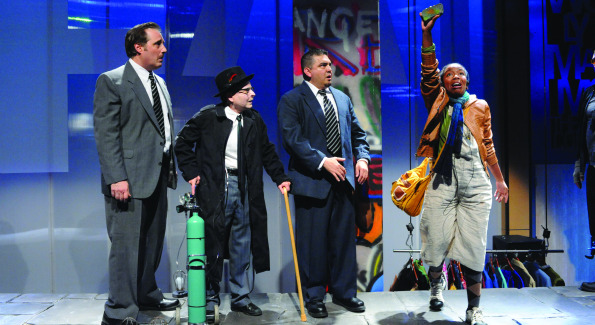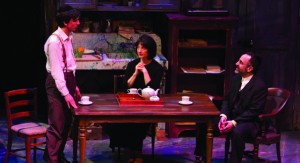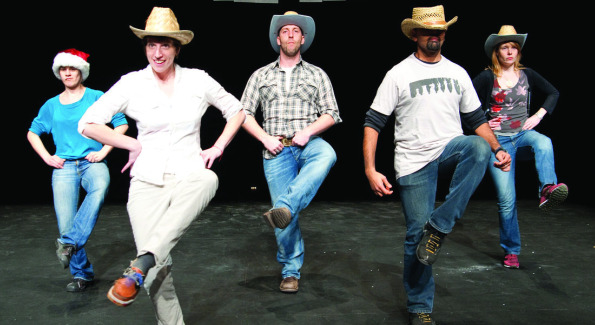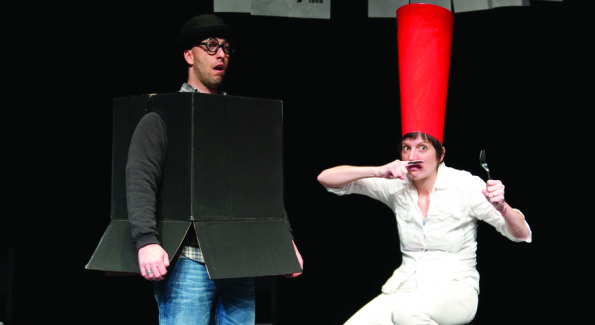D.C. has always played a part on the national political scene. Now our theatre scene is taking center stage.
By Julie LaPorte

Michael Russotto, Sarah Marshall, Daniel Escobar, Jessica Frances Dukes in Woolly Mammoth's Full Circle. Photo by Stan Barouh.
While D.C. hasn’t traditionally been known as a theatre town, we are one of the most prolific theatre scenes in the entire country, rivaling offerings in New York, Los Angeles and Chicago. For audiences in Washington, theatre is much more than commercial entertainment; it’s another avenue to explore the challenging issues of the day.
“There is a tradition of longevity with strong artistic leaders, starting with Zelda Fichandler at the Arena Stage, who have invested in Washington, made Washington their home, gotten to know the community and taken part in the conversation between the work and the audience,” said Howard Shalwitz, Founding Artistic Director of Woolly Mammoth Theatre Company.
There is no doubt that this tradition continues today and is part of what makes our scene so vibrant and unique. Other elements setting us apart from other theatre towns are the caliber of our audience, the breadth of culturally specific theatres and the community outreach that local theatres engage in.
“I feel like we have one of the smartest audiences in the United States,” said Shalwitz. “One of the things I hear from playwrights is that they love the energy and engagement they get from D.C. audiences. I think it has to do with being in the nation’s capital with the particular population we have here and the real motivation of our audience to engage with substantive material on the stage. And I feel like it’s almost impossible to offend a Washington audience; you can bore them, but you can’t offend them. They are up for just about anything.”
Providing these theatre-goers with intelligent, challenging plays are over 70 theatres throughout the region, each one with a unique identity and a culturally specific mission. For every type of theatre you can name, Washington has one of the best examples in the country. There are theatres that specialize in Shakespeare, musicals, commercial hits, literary adaptations, emerging playwrights and experimental works as well as theatres with strong ethnic backgrounds – Irish, Spanish, Jewish, African and French.
“Theater J is defined as a Jewish company and definitely has a foot in the Jewish world,” said Theater J‘s Artistic

Alexander Strain, Lise Bruneau, and Adam Heller in Round House Theatre's My Name Is Asher Lev. Photo by Matt Urban.
Director Ari Roth. “D.C. has had a high concentration of culturally specific companies, and what remains are the strongest ones who are able to make their case vibrantly to a wider audience. At Theater J, we reach out to the entire community, but we are explicit about where we come from.”
“Our literary adaptation program seeks to contribute to what’s going on in the world today,” said Blake Robison, Producing Artistic Director for Round House Theatre. “Even if it’s an old story, we are looking to bring it to life with a contemporary playwright and modern sounding dialogue. We’re looking for scenes and conflicts and characters that resonate with today’s audiences. If you look at the breadth of our adaptations over the years, it can encompass family friendly fare to extremely challenging pieces.”
Connecting with audiences is what theatres in our area excel at. Many of them provide discussion panels on the politically and socially charged themes presented in their plays, like Theater J’s discussions on the ramifications of action versus inaction in In Darfur, or Woolly Mammoth’s network of bloggers bringing the dialogue to the people on the issue of race in neighborhoods explored in Clybourne Park.
Theater J also hosts an annual Voices from a Changing Middle East festival as well as the Peace Cafe, allowing people from different religious and cultural backgrounds to discuss the connection between art and politics. Round House Theatre sends teaching artists into local classrooms to help kids explore dramatic literature, provides senior citizens an outlet for their creativity and presents the Sarah Metzger Memorial Play each April, run entirely by high school students.
Another aspect of community building is the role that our theatres have played in helping neighborhoods reinvent themselves. Ever on the lookout for cheap real estate, theatre companies, especially young ones, settle in up-and-coming neighborhoods, paving the way for restaurants, nightclubs, stores and lofts.
“Theatres have definitely been urban pioneers in the D.C. area for many decades,” said Michael Kyrioglou, Communications Manager for the Helen Hayes Awards. “A perfect example being Source Theatre, Studio, Woolly Mammoth and Arena Stage’s then education arm, Living Stage, staking out territory on a tough 14th Street corridor in the 80s. It was a great thoroughfare until the devastation of the 60s riots, but then these theatres helped to bring life back to that area, now quite different than it was 15-20 years ago.”
Two of the incredible organizations promoting the local theatre scene are the League of Washington Theatres and the Helen Hayes Awards. “Both organizations work on behalf of the theatre community to help promote the full gamut of theatre companies and raise the visibility of all that the community has to offer to residents and visitors, as well as regionally and nationally,” said Kyrioglou.
D.C.’s theatre scene reflects the best of who we as residents are – curious, engaged, open-minded and passionate about the most important issues facing the world today. And the more we participate in the dialogue surrounding these works, the stronger we become as a community.

Eliza Burmester, Mary Fons, Jay Torrence, Bilal Dardai, and Chloe Johnston in Woolly Mammoth's Too Much Light Makes the Baby Go Blind. Photo by Colin Hovde.

Jay Torrence and Mary Fons in Woolly Mammoth's Too Much Light Makes the Baby Go Blind. Photo by Colin Hovde.
